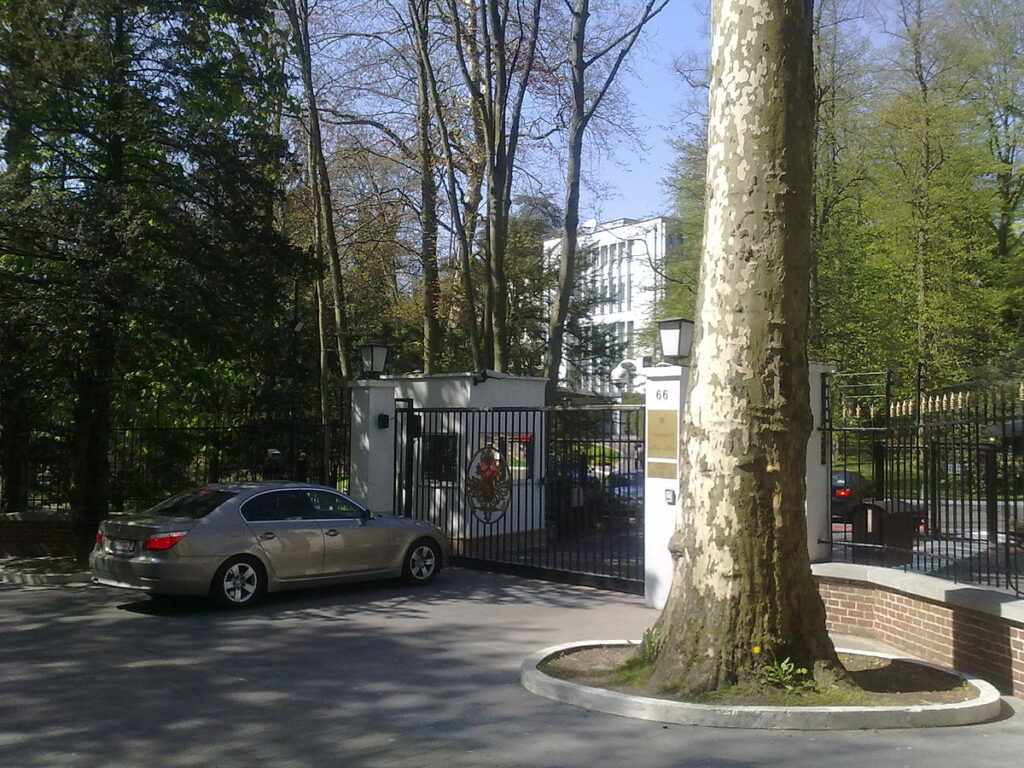Nowhere else in Europe does Russia have as much satellite communication equipment, used for relaying sensitive information back to Russia, as on the buildings of its embassy in Belgium. This is the conclusion of Espiomats, a survey carried out by De Tijd and its European partners.
On the roof of its embassy building in Uccle there are no fewer than 17 satellite dishes, as well as several other antennas and communications equipment which can be used for both communication and espionage.
De Tijd emphasises that Russia certainly does not need as many satellite dishes – certainly not 17. Parabolic antennas found on the roof of the building can particularly be used to intercept telephone communications by satellite. Other antennas can also be used to intercept aeronautical, maritime, military, and other police communications.
Astrid, the telecommunications operator of the Belgian police and security services, reassures that its communications have been encrypted since 2011. Despite this, it is impossible to rule out that new listening techniques and interception methods are not being employed by the embassy staff.
Usual suspects
An investigation published by Russian investigative media Dossier Centre in July 2022 shed light on some of the Russian embassy staff that were ejected from Belgium several months earlier. Among those asked to leave, the majority of which were linked to Russia’s military intelligence service (GRU) or Foreign Intelligence Service (SVR), several members of staff have a background in satellite communications.
Alexei Kozhnevikov, an attaché at the embassy, is likely linked to the 162nd Centre for Military-Technical Information, which teaches Russian GRU operatives how to perform satellite and radio intelligence, particularly for tracking foreign spacecraft and intercepting satellite communications.
Another former embassy worker, Dmitry Chulaev, was linked to a successful private satellite communications company, which works extensively with Russia’s intelligence services. The employee was officially in command of maintaining communications with Moscow from the embassy, but Belgium suspected him of conducting espionage.
Indeed, a vast majority of the embassy staff declared persona non grata by Belgian authorities had a strictly intelligence background, coming from military intelligence academies and organisations.
Related News
In a comment to De Tijd, Minister of Justice Vincent Van Quickenborne noted that Belgium's State Security service “has already established that the amount of equipment on the roofs of the Russian Embassy is considerable.” Despite this, the minister said that it is technically difficult to ascertain the exact equipment installed.
An unnamed Belgian intelligence source told Dossier Centre that he believed that nearly half of the 100 Russian embassy staff were spies. Belgium has been repeatedly criticised for its lacklustre intelligence services, as well as its blasé attitude towards government cybersecurity.
In March 2022, the European Union called on Belgium to strengthen its anti-espionage efforts in a bid to tackle foreign interference in the EU democratic process. It isn't only Russian spies that Belgium should worry: in 2020 it was revealed that CIA and German intelligence had spied on Belgian diplomats for almost 30 years without Belgium knowing.

